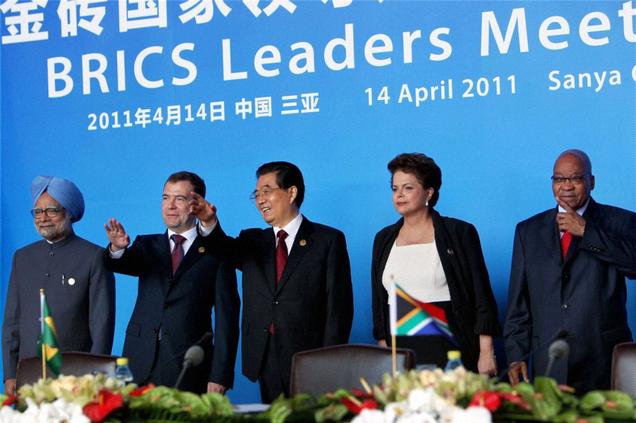
BRICS Leaders, India: Manmohan Singh, Russia: Dmitry Medvedev, China: Hu Jintao, Brazil: Dilma Rousseff, and South Africa: Jacob Zuma.
Just what the Global Markets needs—another international summit. But this one may have lasting implications for emerging nations, and could signal the start of a realignment in global leadership. Leaders of Brazil, Russia, India, China and now South Africa met this week among the balmy palm trees of China’s Hainan Island for the third BRICS summit to discuss global developments, economics and collective trade cooperation. The acronym was coined back in 2001 by an economist at Goldman Sachs to describe the bright emerging economies of Brazil, Russia, India and China. The “S” for South Africa was formally added to the trade bloc this year.
But even as its organizers seek to position this emerging bloc of nations as a new G-5, it has yet to be seen whether this group can unify themselves as an alternative to the Western-dominated tilt in global economics and politics. Brazil, Russia, India, China and South Africa (BRICS) together have a population of over three billion – or about 43% of the world total. The BRICS economies also account for about 20% of global GDP, 15% of WTO foreign trade volume, and attracts fully 53% of foreign direct investment (FDI) – flowing mostly from Western capital markets. By as soon as 2015 the BRICS share of world economic production will increase to 23% of global GDP; and to 31% by 2020. The expected economic performance in each of these nations is leading to both increased standards of living and increase in per capita income. In addition, the summit offers Brazil & China the ability to work out bi-lateral trade issues between the two countries. China actually passed the United States as Brazil’s biggest trading partner in 2009, as trade between the two countries tripled in the past five years to $62.6 Bn. The most recent China-Brazil trade deal, announced in a joint statement at the BRIC summit in Beijing, included the sale of at least 20 E-190 Embraer SA (NYSE ADR: ERJ) jets to China. Interestingly, this most recent summit shows again that the growing influence of emerging nations — political as well as economic — influence cannot be ignored nor negotiated away under traditional Western ‘diplomacy’ schemes and efforts, but rather that their demands will have to be accommodated at all levels of global economic and political levers of power — a topic I’ve previously written about. Read more on that, here.
This is further proof of the emergence of the ‘Beijing Consensus,’ an alternative economic development model to the austere and much criticized Washington consensus. The importance of the BRICS Summit, however, is being played down in Western political and financial quarters, but smart Global Market players will see the Writing on the Wall. For instance, the group has advocated for changes to the global financial system. These include a call for the IMF to replace the Greenback as the reserve currency of choice, and to instead expand its use of Special Drawing Rights (SDRs), which are used as an alternative and more reliable currency index to transfer funds between member governments.
The BRICS called for a broad-based international reserve currency system “providing stability and certainty.” A joint communique, termed the Sanya Declaration, said the current system was no longer representative, calling for a more equitable and representative global economic policy regime noting: “The governing structure of the international financial institutions should reflect the changes in the world economy, increasing the voice and representation of emerging economies and developing countries.” In addition to pushing strongly for a more equitable global economic order, the five nations frowned on the use of force by the West in Libya and supported the return of peace and stability in West Asia-North Africa according only to the “legitimate aspirations of their peoples.” Read more here.
Source: BBC, Reuters, Xinhua News Agency Photo: Times of India